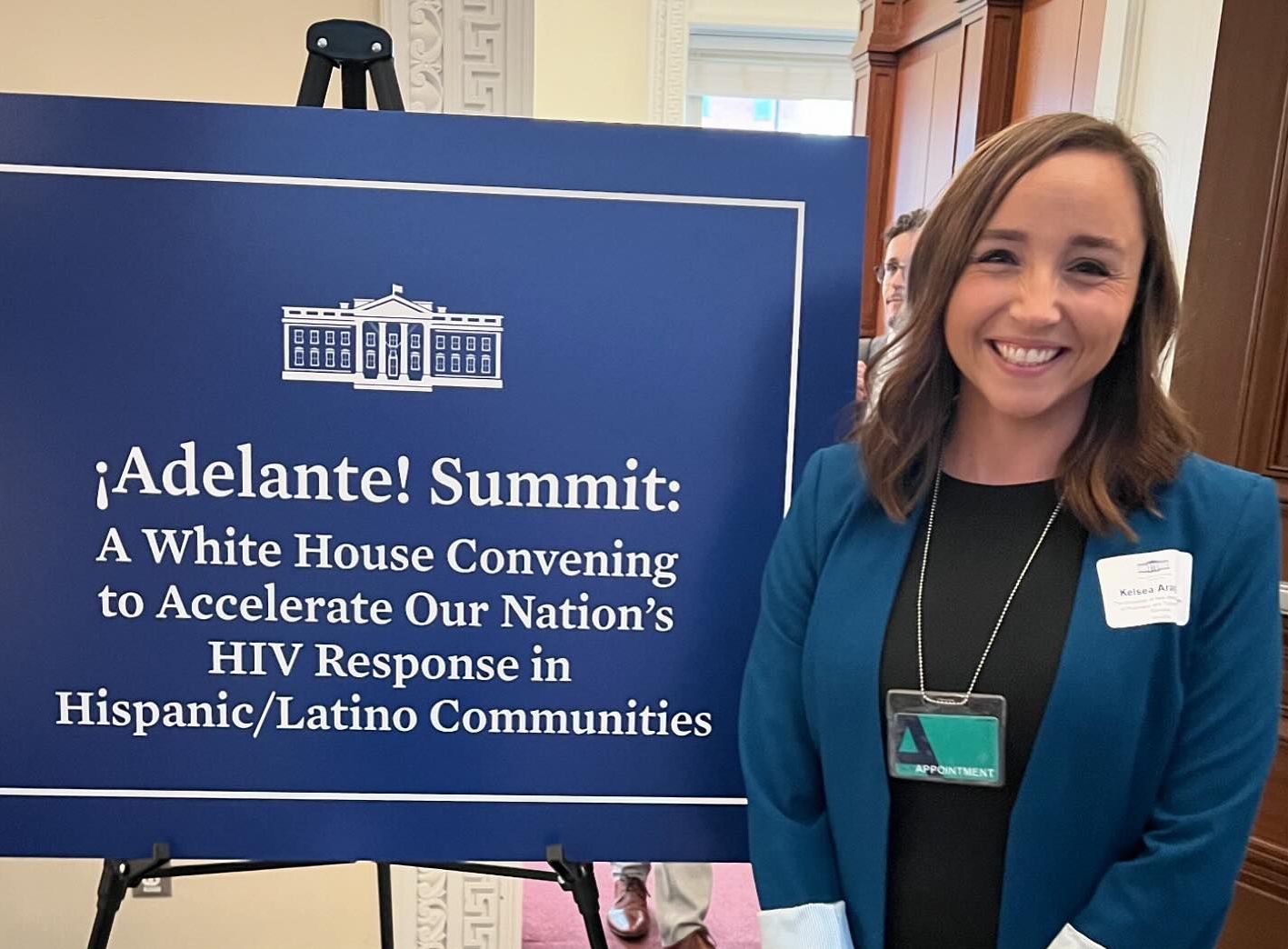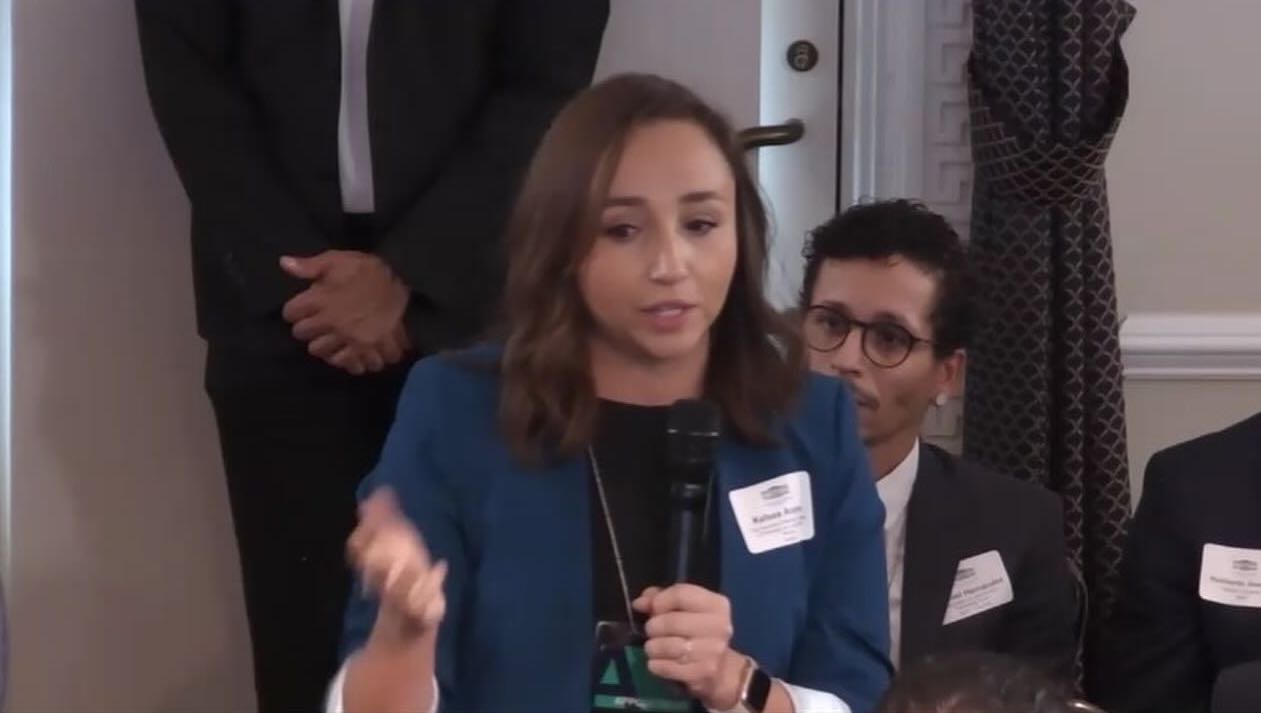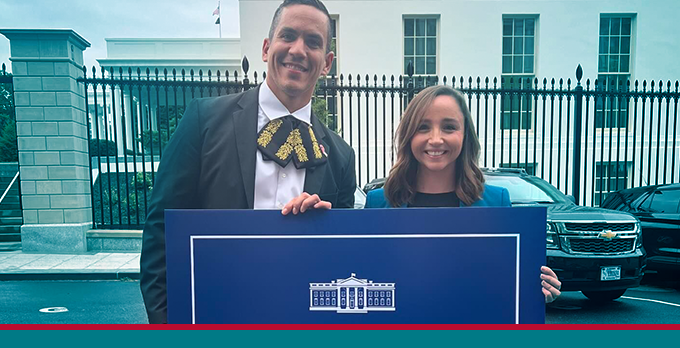A faculty member at The University of New Mexico College of Pharmacy was among the critical voices from across the country at a recent White House summit aimed at advancing the nation's HIV response, particularly in Hispanic/Latino communities.
The ¡Adelante! Summit was held September 24 in Washington D.C. Speakers from all over the nation joined the conversation aimed at accelerating the nation's HIV response in Hispanic/Latino communities. More than 100 leaders participated in-person and many more virtually. The event honored those lost to HIV/AIDS and focused on advancing the Biden-Harris Administration’s National HIV/AIDS Strategy, with an emphasis on prevention, health equity, and collaborative action to end the epidemic.
Kelsea Aragon, PharmD, PhC, grew up in rural Belen, New Mexico. Being invited to the ¡Adelante! Summit held deep personal and professional significance. She never imagined she would one day walk through the doors of the Eisenhower Executive Office Building in Washington D.C. Yet, there she was, surrounded by Hispanic and Latino leaders from across the country, united in their commitment to addressing the HIV epidemic.

“For me, it was inspiring to sit in a room full of predominantly Hispanic and Latino people, all working towards a common goal: advancing the Biden-Harris Administration’s National HIV Prevention Strategy. It was surreal, but it also gave me hope that we can make real progress.”
Aragon’s professional journey is deeply rooted in her commitment to underserved communities. In addition to being an assistant professor in the College of Pharmacy, Aragon also provides care at UNM Truman Health Services, serving a diverse array of patients, many of whom are living with or at risk of contracting HIV. In addition to HIV care, she focuses on pre-exposure prophylaxis (PrEP) to prevent HIV acquisition and offers gender-affirming care for transgender, non-binary, and gender-expansive individuals. Through her work, she not only prescribes vital therapies but also emphasizes cardiovascular risk reduction by managing conditions like diabetes and hypertension—diseases that significantly affect the Hispanic/Latino population in New Mexico.

At the summit, Aragon emphasized how Truman Health Services aligns with the national strategy to reduce HIV rates. As a Ryan White-funded clinic, the organization provides HIV care, prevention, and gender-affirming services. For Aragon, this alignment is not just about following guidelines, it’s about embodying a culture of care that places the needs of HIV-positive individuals and those at risk at the forefront of every decision.
During the summit, she also felt the need to advocate for the role of pharmacists in the national strategy.
“Pharmacists can play a vital role in increasing access to HIV preventative services,” she noted. “In rural areas like New Mexico, pharmacists are often the only health care providers available, and we need to leverage their expertise to improve HIV prevention efforts, especially among Hispanic/Latino communities.”
Collaboration and Cultural Competency: Key Takeaways from the Summit
One of the summit’s central themes was the idea of “Adelante Juntos” or “moving forward together.” This message resonated deeply with Aragon.
“The summit was an incredible opportunity to share best practices from different communities and to explore how we can translate those successes into new areas,” she said. “The hope is that we can collaborate across disciplines and organizations to increase access to HIV prevention and care services.”
Aragon left the summit determined to integrate these ideas into her work, particularly by strengthening partnerships with other health care professionals and community organizations. She also highlighted the importance of addressing cultural and language barriers that impact health care access for Hispanic/Latino communities.
As a native New Mexican with Spanish-speaking grandparents, she reflected on how her family’s history of language loss shaped her views on the importance of communication in health care.
“Language is so tied to cultural identity, and when health care providers can communicate in a patient’s native language, it builds trust and understanding,” she explained. “We need more Hispanic and Latino health care professionals who can reflect the communities they serve.”
Addressing Health Disparities in HIV Care
The data presented at the summit painted a concerning picture: while overall HIV rates are declining nationally, Hispanic/Latino men, particularly gay and bisexual men, are experiencing rising rates of new diagnoses. Aragon stressed the importance of culturally appropriate communications and community engagement to reverse this trend.
“We have to be strategic in how we reach Hispanic/Latino populations, especially in rural areas where healthcare access is limited,” she said.
She pointed to a recent policy change in New Mexico that allows pharmacists to prescribe PrEP in community settings as a potential game-changer.
“Community pharmacists are often more accessible than doctors, especially in rural areas. If we can empower pharmacists to offer these services, we can dramatically improve HIV prevention efforts.”
Moving Forward: A Unified Effort to End the HIV Epidemic
Looking ahead to the National HIV/AIDS Strategy’s ambitious goal of ending the epidemic by 2030, Aragon is both hopeful and realistic. While she acknowledges the progress being made, she also recognizes the challenges that lie ahead.
“As we increase testing, we’re likely to see an uptick in new diagnoses, especially in communities that have been underserved,” she noted. “But the key is to ensure that those who test positive have access to care and that we continue to expand prevention services.”
For Aragon, one of the most significant takeaways from the summit was the importance of collective action.
“We’re not working in silos,” she emphasized. “Together, we can reach the goal of no new HIV infections by 2030, but it requires collaboration, communication, and a shared commitment to serving our communities.”
A Call to Action
Aragon’s experience at the ¡Adelante! Summit has reinforced her belief that pharmacists and other health care providers have a critical role to play in the fight against HIV. Her message to the broader public is clear:
“This isn’t just about health care providers or the Hispanic/Latino community—it’s about all of us working together. We need to destigmatize HIV, encourage testing, and ensure that everyone has access to the preventative care they need.”
As the nation moves forward with its HIV prevention strategy, Aragon stands ready to continue her work, armed with new insights and a renewed sense of purpose.
“Adelante juntos—let’s move forward together,” she said, echoing the summit’s resounding call for unity and action.
